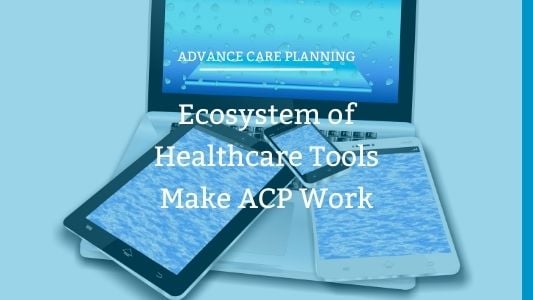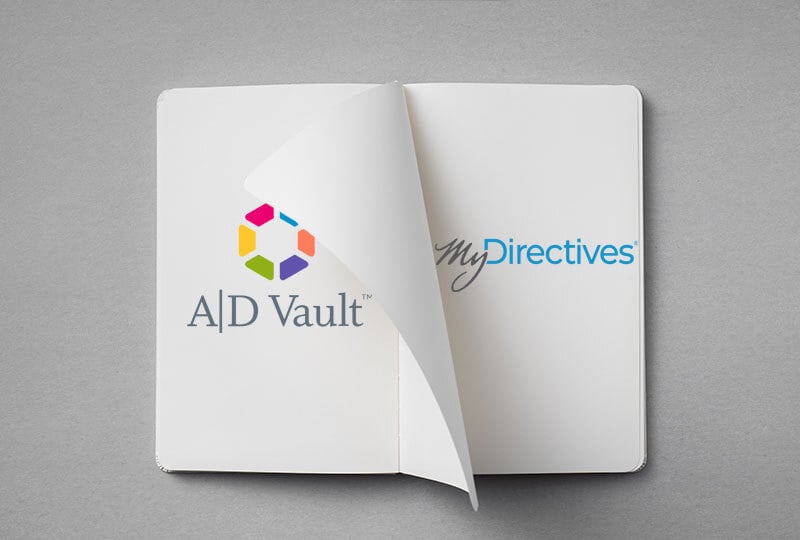
When we started ADVault back in 2007, we were determined to create a company that would give patients a voice and allow them to establish a plan for their own healthcare even when they suffered a medical emergency and couldn’t communicate with caregivers or medical personnel. We quickly learned there were three major problems around advance care planning (ACP).
- Advance directives rarely existed. Only 18-36% of adult Americans had created any form of advance directive.
- When they did exist they couldn’t be accessed. Only 2% of existing documents could be located or retrieved when needed.
- Of that 2%, few provided actionable information. The documents contained conflicting or ambiguous answers, or they simply did not provide the information providers needed.
To accomplish our mission, we would have to build solutions to address all of these challenges to enable each of the three major healthcare stakeholders (payers, providers and patients) to get exactly what they need out of the ACP ecosystem.

Common ACP misconceptions
It wasn’t enough to address the three major problems around ACP. We also needed to navigate a unique collection of misconceptions. Unsurprisingly, this aspect of healthcare is often overly complicated or neglected.
- Due to the historical origins and use of advance directives, many payers traditionally thought they were only appropriate for people in the last 6 to 12 months of life. The reality is that basic emergency and ACP is appropriate for anyone over the age of 18.
- Many payers also believed ACP to be a taboo subject they could not raise with their members without being accused of supporting “rationing of care” and “death panels.” Again, reality does not support this belief. A survey performed by the National Journal and the Regence Foundation found that 79% of respondents thought it was “definitely” or “probably” a good idea for doctors to conduct ACP with seriously ill patients, and 81% of respondents in the same survey thought it was either a “very good” or a “somewhat good” idea for insurance plans to cover a doctor’s time to provide ACP services to patients.
- Payers believe their members aren’t interested in ACP because advance directives and payer programs promoting them have historically had low adoption rates. People do want to talk about ACP; however, they’re impeded by not knowing how or where to get started. Advance directives can also seem difficult or overwhelming to use.
With this array of challenges and misconceptions in front of us, we set out to build an ecosystem of tools to make ACP easier and more intuitive for payers, providers and patients.
Addressing the needs of patients, providers and payers
First, we knew we needed to make ACP simple for patients, their caregivers and their loved ones. So, we created MyDirectives, a free online tool that helps people create high-quality ACP documents or store the ones they already have, then share them with people in their circle if they choose to do so.
 ADVault addressed the problem of being unable to access patient documents by creating a cloud-based, secure and interoperable global registry of ACP documents and portable medical orders like Physician Orders for Life-Sustaining Treatments (POLST) forms. ACP documents and portable medical orders saved by consumers using MyDirectives or created and uploaded by medical professionals using ADVault’s suite of clinician-facing tools are stored within the ADVault Exchange. Once stored, ACP documents can be located and retrieved 24/7 from any location across all care settings.
ADVault addressed the problem of being unable to access patient documents by creating a cloud-based, secure and interoperable global registry of ACP documents and portable medical orders like Physician Orders for Life-Sustaining Treatments (POLST) forms. ACP documents and portable medical orders saved by consumers using MyDirectives or created and uploaded by medical professionals using ADVault’s suite of clinician-facing tools are stored within the ADVault Exchange. Once stored, ACP documents can be located and retrieved 24/7 from any location across all care settings.
Some of our competitors are focused almost exclusively on giving healthcare providers tools to conduct ACP sessions with their patients. However, they don’t provide a consumer-facing solution. We knew patients would want greater control over their healthcare experience and that their values might change over time. ADVault’s consumer-facing tools allow patients to easily access and change their ACP documents, increasing their trust in the healthcare system.
For healthcare providers unsure about how to address the topic of ACP with their patients, ADVault’s clinician tools ease the process. They equip providers to have high-quality ACP conversations with patients and provide a powerful suite of reporting tools to administrators to monitor the success of their ACP efforts and patient progress. They also provide for the uploading of ACP documents and portable medical orders — already existing and siloed in big electronic health record (EHR) platforms — into ADVault’s registry.
Finally, all of our tools are built to promote healthcare payer member and in-network provider engagement and to assist payers in measuring that engagement so they can drive the ACP process with their members and providers. Our reporting solutions also help Medicare Advantage and Value-Based Insurance Design (VBID) model participants comply with reporting requirements established by the Centers for Medicare & Medicaid Services and the Center for Medicare & Medicaid Innovation.
Because our solutions are based on helping all of the stakeholders involved in the ACP process, no one is excluded and we address the concerns of each group. Everyone ends up on the same page regarding:
- Which medical interventions the patient wants
- Which medical interventions they don’t want
- Who is in charge of making decisions for the patient
At each step, the patient’s wishes and decisions are at the forefront of their healthcare experience.
Why it matters
Ultimately, ADVault’s suite of ACP solutions is designed to help grow the adoption and normalization of ACP. I wrote a post in June exploring how COVID-19 has increased the need for digital advance care planning. As events like COVID-19 occur, physicians have these important conversations with their patients, and as patients experience the peace of mind that comes with having a high-quality ACP document in place, we expect adoption will continue to grow.
As mentioned earlier, the idea of promoting patient voices had a huge impact on our decision to create ADVault. That hasn’t changed. We still believe in the importance of this goal, and our tools play an important role in bringing it to fruition.
There’s a significant direct financial benefit to healthcare payers if we can get ACP right. In one of our earliest commissioned independent actuarial studies, actuaries estimated that the potential cost savings to Medicare could be as high as $17.3 billion annually just from avoiding unnecessary and unwanted ventilator use in the ICU.

There are also considerations other than the direct savings that come from not paying for medical treatments patients and their loved ones don’t want. There’s the stress and lost productivity of caregivers attempting to care for loved ones without a clear concept of their wishes. The experiences of patients’ families can also affect quality ratings.
Healthcare providers without access to ADVault’s ecosystem of solutions might also have a harder time caring for their residents and patients, resulting in lower quality scores, decreased employee morale and higher patient safety risk. Access to the right tools creates loyalty and satisfaction, driving quality measure compliance, STAR ratings, headcounts and even revenue.
You don’t have to do it on your own
Without a partner like ADVault, healthcare payers and providers are left to piece together solutions on their own, sometimes neglecting the ACP process entirely. At ADVault, we understand the needs and concerns of each stakeholder in the healthcare system. That’s why we’ve put together an ecosystem of tools to address all the challenges and misconceptions that come with ACP.
We offer flexible, modular solutions that allow healthcare payers and providers to start wherever it is “best” for them. The included reporting functionality contributes to transparency and ease of use for every tool, and we’ve made the implementation process stress-free and simple.
Contact ADVault to discuss ACP solutions for you, your members and your network providers.
Let’s get started on digital ACP together
Secure, Interoperable, Accessible.
MyDirectives offers the only digital advance care planning (ACP) tools and interoperable cloud-based storage that is HITRUST Risk-Based 2-year Certified.







